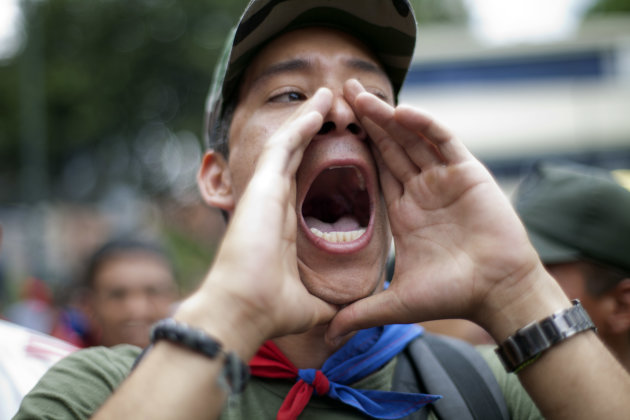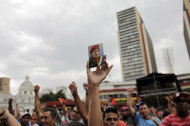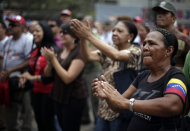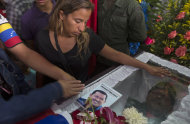Iktibar yang boleh diambil daripada pilihanraya Presiden Venezuela ialah:
1. Keputusan PR dipertikaikan dan pihak yang kalah dan membawanya ke tengah jalan.
2. Kemenangan kecil yang diperolehi oleh pemangku Presiden sudah pasti membuatkan kedudukan beliau goyah, dipertikai dan kurang diterima oleh penduduknya.
3. Campur tangan asing dalam pemilihan tersebut akhirnya akan menjerumuskan negara itu ke kancah perang saudara yang berpanjangan sekiranya gagal dikawal.
4. Tindakan kerajaan untuk mengawal keadaan akan diperbesar-besarkan oleh akbar asing yang mempunyai niat atau tujuan lain selain daripada ingin menegakkan kebenaran.
5. Pihak yang kalah enggan menerima kekalahan dan membuat pelbagai tuduhan termasuk penipuan dalam pengiraan undi.
6. Jika berterusan negara tidak akan stabil dan itu akan menggembirakan Amerika yang memusuhi Venezuela sejak sekian lama.
Venezuela crackdown deemed worst in years
By | Associated Press
View Photo
Associated Press/Ramon Espinosa - A 'Chavista' demonstrator shouts as supporters of President-elect Nicolas Maduro march in front of the National Electoral Council (CNE) in Caracas,Venezuela, Wednesday, April
Related Content
 View PhotoA "Chavista" demonstrator, and …
View PhotoA "Chavista" demonstrator, and … View Photo'Chavista' demonstrators, supporters …
View Photo'Chavista' demonstrators, supporters … View Photo
View Photo
CARACAS, Venezuela (AP) — National Guard troops beat dozens of opposition supporters inside a barracks for refusing to accept the government-certified electoral victory of Hugo Chavez's heir, a leading human rights lawyer charged Thursday in what he called Venezuela's worst political repression in six years.
Alfredo Romero said his group's lawyers also compiled evidence supporting opposition activists' claims that National Guard troops had used excessive force against protesters, including shooting some point-blank with plastic shotgun pellets.
As details of the crackdown emerged, Nicolas Maduro prepared to be sworn in as president and the speaker of the National Assembly again threatened to bar the opposition from its only remaining political platform, the legislature, unless it recognized Maduro's legitimacy.
Romero said the beatings occurred at National Guard barracks No. 47 in the western city of Barquisimeto after at least 300 protesters were arrested across Venezuela for backing opposition candidate Henrique Capriles' demand for a recount of all the votes cast Sunday.
Interrogators "put baseball caps on these kids' heads with a pro-government insignia ... and made them say they recognized the Maduro government, and if they said 'No' they were beaten," Romero said, adding that most of the detainees ranged in age from 15 to 22.
Asked about the allegations, Interior Ministry spokesman Jorge Galindo called them "totally false, absurd and without basis." He said the detainees, though in a military barracks, were being overseen by ministry officials to "guarantee their rights."
Romero called the crackdown Venezuela's worst since Chavez shut down the opposition TV station RCTV in 2006 when more than 250 people were arrested. His 12-year-old group, Foro Penal Venezolano, has more than 200 lawyers who represent without charge people they consider political prisoners.
He said the group has complained to the Inter-American Human Rights Commission, whose rulings Venezuela's government no longer recognizes, and is preparing a complaint to the International Criminal Court.
One of the worst cases of excessive force this week occurred in the central city of Valencia, members of the opposition's youth wing said in Caracas.
They said National Guardsmen fired plastic pellets at extremely close range at a group protesting the regime-friendly National Electoral Council's decision to ratify the victory of Nicolas Maduro.
Maduro is to be sworn in Friday in the National Assembly at a ceremony being boycotted by the opposition because its deputies are not being allowed to address the body unless they recognize his presidency as legitimate.
The government says 15 countries including Iran, China and Saudi Arabia were sending high-level delegations. Brazil said its president, Dilma Rousseff, was attending as was Argentina's Cristina Fernandez, but it was not clear whether the president of neighboring Colombia, Juan Manuel Santos, would attend.
On Thursday, Maduro headed to Lima, Peru, for an evening meeting of presidents of the Union of South American Nations, UNASUR, to discuss Venezuela's post-election tensions.
The meeting was convened by Peru's president, Ollanta Humala, who holds the organization's rotating chair, and every leader on the continent save Ecuador's Rafael Correa, who was traveling in Europe, was attending, said Peru's deputy foreign minister, Fernando Rojas.
The youth opposition wing members displayed photographs showing deep, bloody wounds on the skin the hand and arm of Jonny Alvarado, a local leader of the centrist Proyecto Venezuela party who they said had been shot three times in the arm and undergone two surgeries in an attempt to save his hand.
The AP confirmed Alvarado's non-life-threatening injuries with the director of the hospital where he was treated.
At least 10 other activists were hit by pellets, some in the head, but not hurt as seriously, said Carlos Graffe, Proyecto Venezuela's youth leader. He said other protesters were punched or hit with batons by National Guardsmen.
A total of 400 were injured nationwide by authorities and government backers, said Juan Requesens, national coordinator of the opposition's youth wing.
In Monagas state, a group of 30 to 40 protesters was attacked by pro-government forces, then detained by authorities when they tried to flee, said Diego Scharifker, president of the youth wing of the Nuevo Tiempo party. He said virtually all were anti-government, but National Guard members had even swept up a handful of pro-government youth during sweeps of streets.
Romero said other activists described being arrested as they were walking home from peaceful protests.
The government alleges Capriles' backers have incited all the postelection violence, which it says has caused eight deaths and 70 injuries. It also charges the opposition loyalists have burned eight health clinics and several offices of the ruling United Socialist Party of Venezuela.
Non-government media and private citizens have published photos of unmolested clinics and party offices that they said disproved the claims.
Chief Prosecutor Luisa Ortega reiterated on Thursday the government's contention that neither it nor its supporters were to blame for any of the violence that followed Sunday's vote.
"A common denominator is that the wounded and injured are all supporters of Chavismo," she said in an interview on state TV.
Romero said 71 youths in all were arrested in Barquisimeto on Monday and Tuesday, when opposition supporters marched on regional offices of the electoral council, while 83 were arrested in Valencia over those two days.
He said it appeared that most were being freed Thursday, but that many faced criminal charges that include public incitement, destroying public property and other crimes.
Other arrests occurred in the states of Barinas, Merida and Maracay, Romero added, but he said he didn't have solid information on events there.
The prosecutor, Ortega, said Thursday that a total of 135 people had been arrested across Venezuela, with 90 of them charged with crimes.
The country awaited, meanwhile, word on whether the electoral council would agree to Capriles demand for a vote-by-vote recount after receiving the opposition's petition on Wednesday.
National Assembly Speaker Diosdado Cabello repeated the threat he made Tuesday to bar the opposition from the chamber, it's only platform on the national political stage. The opposition has just three of Venezuela's 23 governorships.
"I repeat to deputies of the opposition, just in case by chance they didn't understand, if they don't recognize Maduro as president I won't recognize them in the AN (National Assembly)."
There would be no constitutional basis for such an action, but Maduro and his ruling circle has paid little heed to the document since their mentor disappeared in December to Cuba for cancer surgery, never to be heard from publicly again.
Cabello was one of the closest allies of Chavez, who died March 5 after a long battle with cancer.
The ruling socialists control the legislature with 165 seats to 98 for the opposition and elections are not due until next year.
1MALAYSIA TOLAK FITNAH, TOLAK PKR, DAP DAN PAS, SELAMATKAN MALAYSIA DARI PAKATAN. U ULANG SOALAN, I SAMAN YOU. JANGAN PERCAYA JANJI2 PAKATAN.
No comments:
Post a Comment